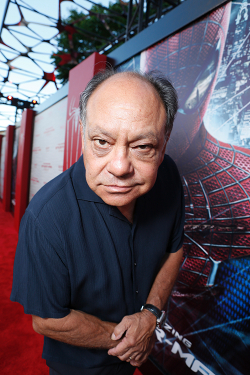
Call me stodgy, but I'm not easily sold on movie reboots. Usually they focus on the trappings but miss the essence. Or they turn either insanely histrionic or joylessly brutal. Or they try to transform the material into something it simply isn't. Many a shrug, these past few years.
The good news is that The Amazing Spider-Man is truly amazing. Yes, it's an origin story. And yes, it's an excellent one. It's engaging and thrilling and even moving, and our screening was visually stunning in 3-D IMAX. Tip-top score by James Horner, too. Enthused, I spoke with its director, Marc Webb.
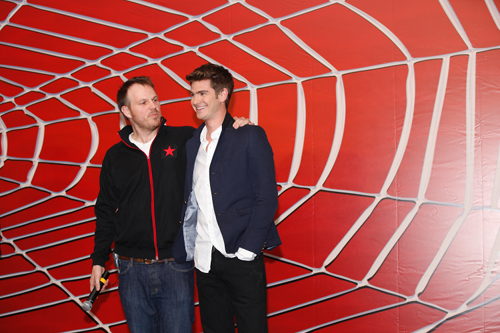
Two years ago: Marc Webb and Andrew Garfield begin spinning.
First I cite the elephant in the room. Since the grand series' former helmer Sam Raimi hails from Michigan, and Webb is from Wisconsin, is there some clause stating that only guys from states with a lot of lakes can direct Spider-Man movies?
"I think that Minnesota always brags about how many lakes they have," responds Webb, dryly, "so they should be in the mix as well." I note that the cinematic Coens are Minnesotans. "I'd see that, the Coen brothers' Spider-Man: I'd be first in line," he proclaims.
But let's focus. Webb is best known for the L.A.-young-guy-romantic-angst manifesto (500) Days of Summer, and while he brings to The Amazing Spider-Man all the superhero sensation of the popular webslinger, there's also a tone a few shades truer to the life most people generally inhabit. We discuss.
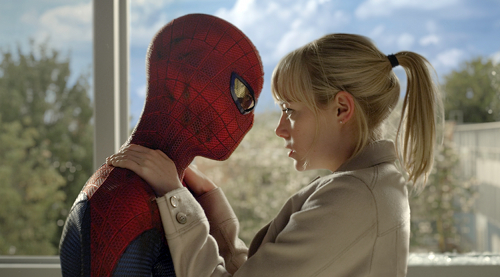
Andrew Garfield (left) and Emma Stone
"There's a lot of layers there," he reveals. "Look, I'm not a funny guy. I'm not. I'm surrounded by funny people, but I'm not funny. The one thing I think I understand is emotional honesty -- and a lot of things can come from that. The drama comes from that, and the humor comes from that, and it's more interesting in the long run to find something that's based in reality." He refers back to the plentiful evidence in (500) Days (co-written by Scott Neustadter in what I heard the writer say started off as a much angrier script), then brings the topic back to the new Spidey:
You want the protagonist to endure as many crazy, extreme situations as possible. And what I'm most proud of in Spider-Man is that there's a lot of emotional dimension -- sometimes it's funny, sometimes it's tragic, sometimes it's exhilarating, sometimes it's cold. And that was what I was after, a sort of emotional bouquet, if you will.
This movie features all-American Peter Parker in high school (played credibly by English lad Andrew Garfield, from also-Minnesotan Terry Gilliam's brilliant Imaginarium of Doctor Parnassus), with the romantic interest centering not on Mary Jane (love ya, Dunst), but on Gwen Stacy (Emma Stone, a plausible blonde, go figure). I ask Webb about their combined process.
What was important to me was to protect the small, intimate moments, the awkward tenderness of what it meant to be an adolescent -- in the midst of this big spectacle. I wanted to have spontaneity and improvisation, and for them to feel genuine, because in a very real way it's the engine of the film.
He connects the dots: "The advantage of doing a Spider-Man movie was to find the little movie within -- because that's what Spider-Man comics are like!
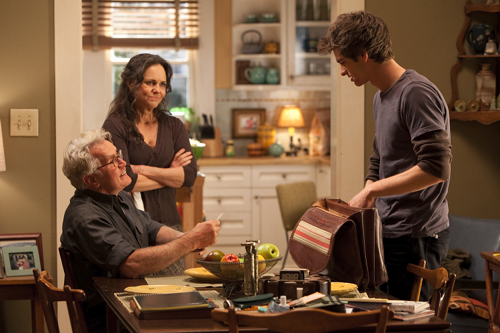
Martin Sheen and Sally Field are in this movie!
Peter Parker has this quiet little life, that's exactly like all of our lives: He's got to do chores, and he has trouble talking to girls, and he's got a curfew, and the fundamental domestic dramas that we all go through, it makes him so relatable! He's not a billionaire, he's not an alien, he's just this kid.
We extol the virtues of Marvel Comics -- the human tics in superhuman characters -- then turn to this film's surrogate-father/supervillain, one-armed Dr. Curt Connors, teased in Spider-Man 2 but now in full-blown Lizard mode. I must know: Was Rhys "Danny Deckchair" Ifans willfully doing a David Warner? (Either way, it's a standout performance.)
Actually, the truth is, have you seen M -- the Fritz Lang movie with Peter Lorre? That desperation was a model for that character, and the idea is that he's an addict -- unable to control his Lizard Id that has slowly unhinged him.
Webb adds that playing the Velvet Underground's "Heroin" helped them nail the role.
The Amazing Cheech attends première.
I ask about Stan Lee. How can one not ask about Stan Lee?
"I had lunch with him very early on," answers Webb, "and one of the things he said was: 'Put yourself in Peter Parker's shoes -- and whatever you would do, he would do. It's all about relatability.'"
That's what he said. And in terms of the cultural nuance, yes, there's technology, there's cell-phones. It was very important to me to conceptualize Peter Parker in a contemporary way. I wanted him to listen to music that we recognize, I wanted him to have posters on his wall from movies that we've seen.
(Rear Window; go, Peter!)
I note that this movie features my fave Stan Lee cameo thus far. (I'm grinning just thinking about it.)
Webb adds that his Peter Parker, while scientifically advanced, is less Tobey Maguire's supernerd than a willful outsider with a chip on his shoulder -- your surly neighborhood high-school kid. Probably with a blog. (Co-screenwriter Steve Kloves -- who smartly adapted most of the Harry Potter books to film -- brings his sensitive touch to the material.)
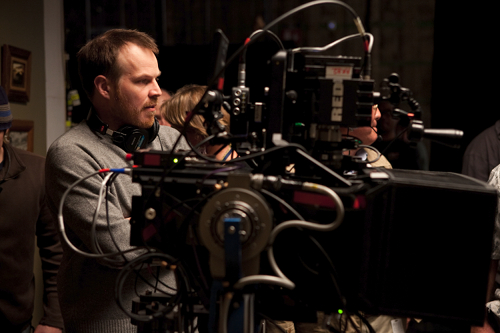
Webb with the Amazing RED camera on 3ality Technica rig.
All that said, The Amazing Spider-Man also happens to rawk. This thing looks like two-hundred-million bucks, shot on RED cameras with revolutionary native-3D camera rigs from 3ality Technica -- who represent several massive movies this year, from Prometheus and Jack the Giant-Killer to The Great Gatsby and The Hobbit. I'm no tech-head, but I know state-of-the-art when I see it, and this isn't your slightly-older-sibling's Spider-Man.
But where it counts is the drama -- which fires on all cylinders in the big mid-film showdown on New York's Williamsburgh Bridge. I won't spoil it (for, thanks to C. Thomas Howell, it connects, via ordinary Joes doing extraordinary things, to the climax), but rather allow Webb to close with a quick lesson in film theory, and maybe life itself:
Weirdly, in the action, the same principles apply as in the other scenes. An action scene, at its best, has an emotional undercurrent," he reveals to aspiring filmmakers the world around. "It's about character development. At the beginning of the scene, Peter Parker is motivated primarily by vengeance; his crimefighting is incidental. At the end of the scene...there's a reconciliation...the like of which Peter Parker realizes he's never going to have. Andrew does a beautiful thing, he tilts his head to the side, and you realize there's a kid behind this mask, envying that experience, envying that moment -- but also letting it go. It's one of my favorite moments in the movie, because there's a real emotional connection to the action.
Hey, it got me.
The Amazing Spider-Man is now playing in your friendly neighborhood.
All photos courtesy of Sony Pictures.
